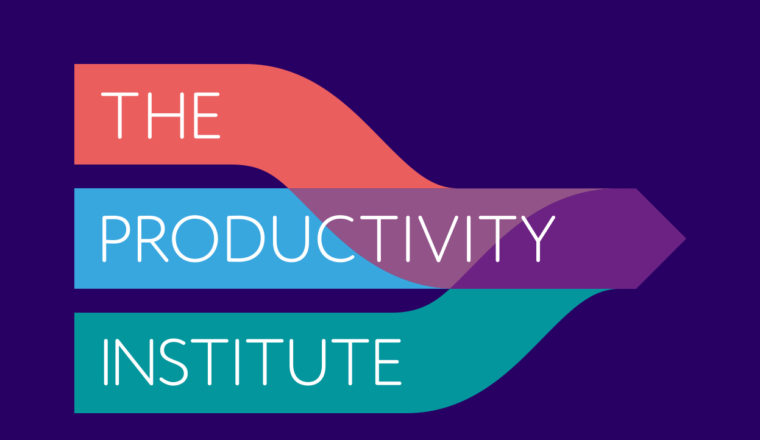The Productivity Institute at Trade Unlocked 2023
On 20 June, The Productivity Institute hosted a session at Trade Unlocked in Birmingham, a national conference that brought together businesses of all sizes to discuss and address the challenges of the current trading environment.
Can productivity unlock the UK economic revival?
Productivity growth has slowed worldwide over the past 16 years, but why has the UK struggled more than other similar countries and what can be done to reverse the trend? In this session, Professor Bart van Ark, Managing Director of The Productivity Institute, put forward his diagnosis of the UK’s productivity puzzle – broad chronic underinvestment, and a shortage of firms that accept and implement new ideas and technology. The panel discussed research that underlines how exporting and innovation can make firms more productive and the importance of Foreign Direct Investment, as well as how regions and businesses can maximise the benefits of best practices.
Bart was joined on the stage by four expert panellists:
-
- Tera Allas CBE, Director of Research and Economics at McKinsey
- Nigel Driffield, Professor of International Business at Warwick Business School
- Halima Jibril, Research Fellow at the Enterprise Research Centre, University of Warwick and The Productivity Institute
- Donna Edwards, Managing Director for Business Support and Business Finance at The Growth Company

Nigel Driffield, Halima Jibril, Tera Allas, Donna Edwards and Bart van Ark at the Trade Unlocked panel.
Productivity helps businesses to use their resources more efficiently, freeing up money for investment in new business activity and jobs. Productivity supports workers’ income. And productivity helps society as the proceeds from technology and innovation spill over to other aspects of life, including health care, education and smarter ways to clean up our environment.
However, the UK is in a productivity slump and has been since the 2007-08 global financial crisis. Had productivity in the UK grown in line with its previous trend, the UK economy would be approximately £300 billion larger today. Compared to many of the UK’s peer nations, such as France, the USA and Germany, UK productivity is lower, and by some estimates up to 20% lower. If production per hour worked since 2007 had increased at the same rate as it did in the 15 years before, the economy would have been some £300 billion larger today – equalling an average extra gain of about £11,500 per household in the UK.
Research from The Productivity Institute
Businesses are the main drivers of productivity growth, yet it often remains unclear to leaders exactly how senior leadership teams and boards should be thinking about productivity, and how they can incorporate it into their everyday actions to add value. There is typically a gap in terms of communicating key productivity messages within a firm, making decisions, planning, and then translating them into actions. Research from The Productivity Institute recommends that senior managers and leaders think, talk, collaborate, strategise, prioritise, and implement strategic productivity within the functions of finance; human resources; operations, technological and digital; and marketing and communication and in the boardroom itself.
- Download the Strategic Productivity for the Leadership Team report to find out the key drivers of business productivity
Foreign Direct Investment
Professor Nigel Driffield, who was part of The Productivity Institute’s panel at Trade Unlocked, has authored two briefings tracking the changing patterns of inward investment in the UK as we emerge from COVID-19, and as our trading relations with the rest of the world become more certain. The reports are a collaboration between Warwick Business School and Moody’s Analytics funded by The Productivity Institute and explore the latest intelligence on foreign direct investment (FDI) flows into the UK, and what that means for productivity.
For more insights from Professor Driffield on inward investment and FDI, watch him at the CAGE Research Centre UK After Brexit event in 2017.
Professor Driffield is also involved in two research programmes funded by the Economic Social Research Council:
- Maximising the benefits of inward investment – how best to target limited funds
- From productivity to prosperity: Inclusive growth for the West Midlands
The benefits of exporting
Dr Halima Jibril, who was part of The Productivity Institute’s panel at Trade Unlocked, has co-authored research examining why exporting firms are more productive. In Of chickens and eggs: Exporting, innovation novelty and productivity, Dr Jibril and Professor Stephen Roper ask if more productive firms export or does exporting lead to higher productive firms? The ONS estimated that in 2016, only about 5% of all UK firms were engaged in international trade. These firms were, however, around 20% more productive than non-trading firms, and they accounted for over 40% of employment. A key role is innovation – it allows firms to develop products and services suitable for exporting, which in turns provides access to new ideas from foreign markets, encouraging further innovation.
- Find out the policy implications by reading the paper and the executive summary
About The Productivity Institute
The Productivity Institute is a UK-wide research organisation that aims to pinpoint the causes of stagnation in UK productivity and focus energies to laying the foundations for a new era of sustained and inclusive productivity growth, which will improve our material standard of living.
Our interdisciplinary world-class research draws on expertise from social sciences, engineering, physics, political science, business management, innovation research and data science. This research is developed in collaboration with ten academic partners across the UK business, through our eight Regional Productivity Forums, and policy users, through The Productivity Commission, which is led by partner NIESR.
Productivity Puzzles podcast
The Productivity Institute produces a podcast that takes a deep dive into why productivity matters and examine how it can it drive business success, economic recovery, but also prosperity, wellbeing and inclusive sustainable growth.
Hosted by Professor Bart van Ark, Managing Director of The Productivity Institute, the podcast is in its second season, with episodes covering the global and European productivity outlook; science and innovation policy; the role of Further Education Colleges in skills and innovation; the four-day working week; and greening productivity.
- Listen to Productivity Puzzles wherever you get your podcasts




